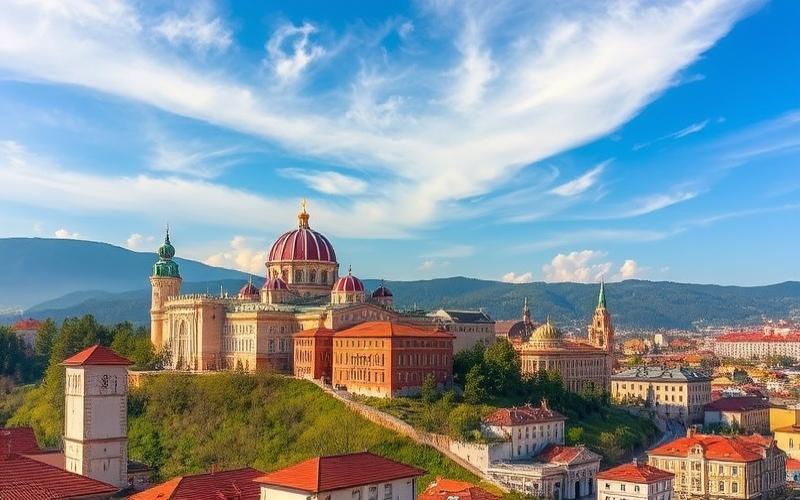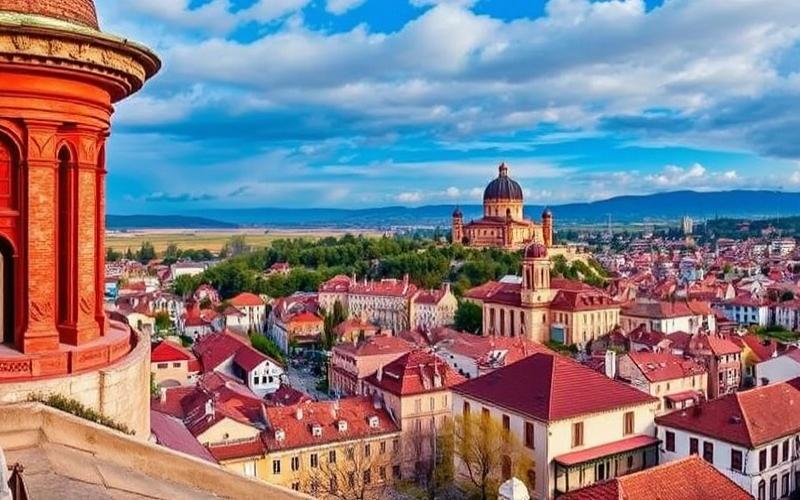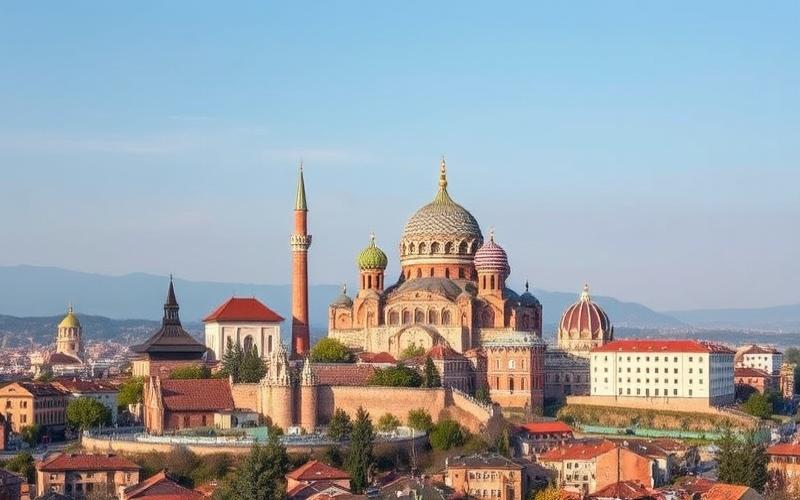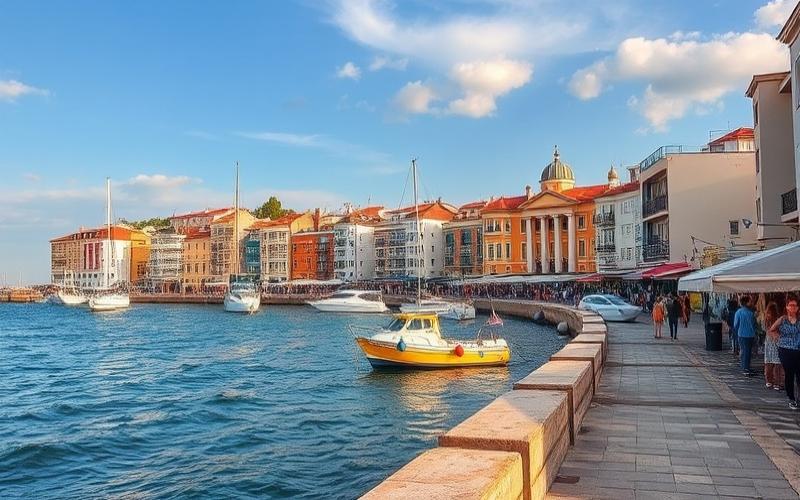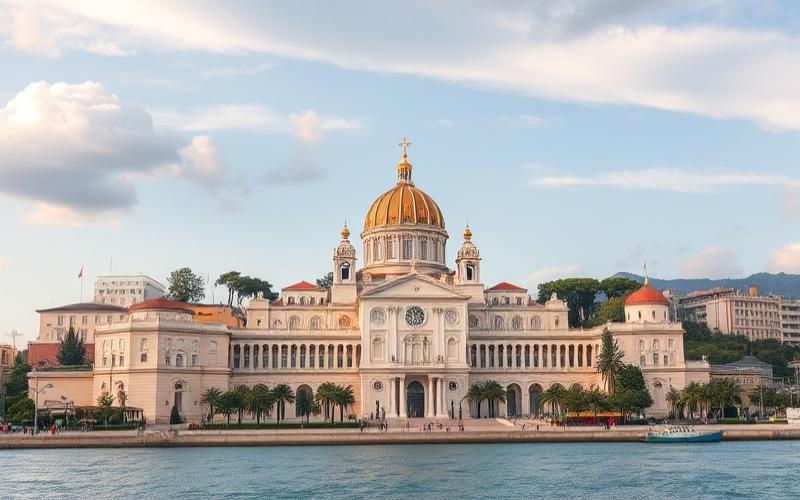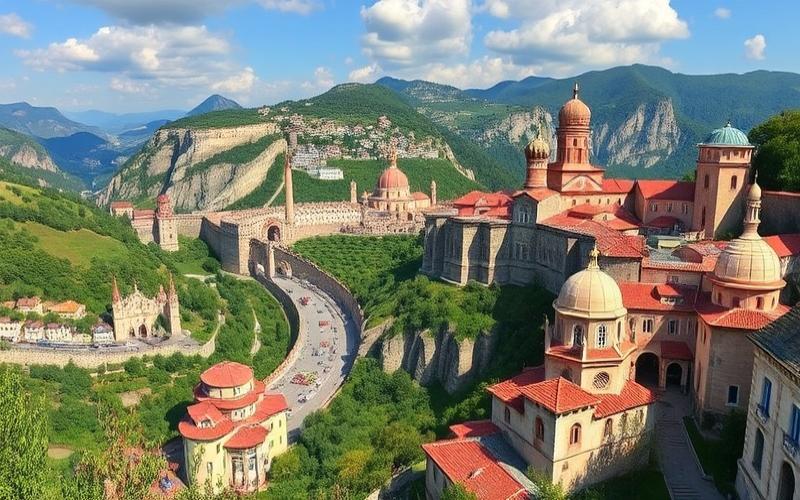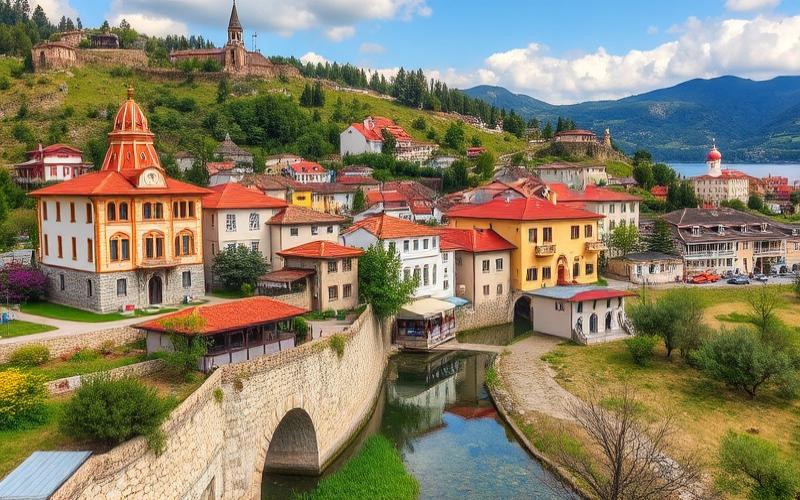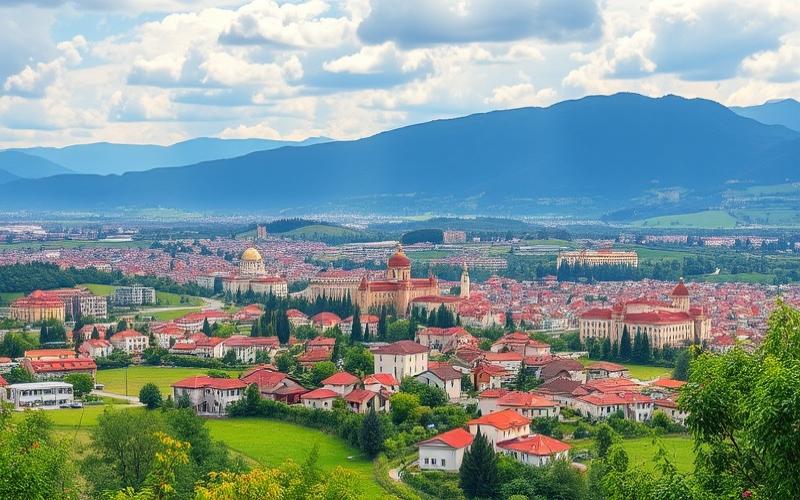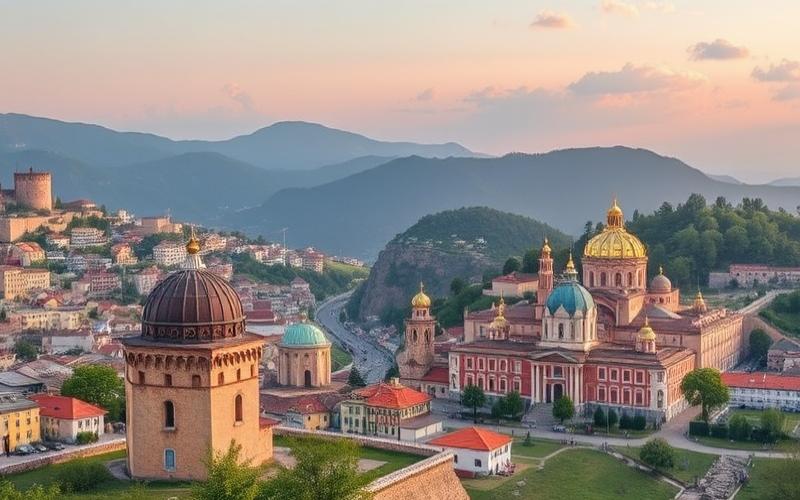
 Published on and written by Cyril Jarnias
Published on and written by Cyril Jarnias
In recent years, Bulgaria has become a sought-after destination for digital nomads, drawn by its scenic beauty and relatively low cost of living. This phenomenon is causing a noticeable shift in the rental market, where demand for short-term housing has increased, turning some Bulgarian neighborhoods into true international hubs. While this trend boosts the local economy, it also raises questions about housing availability and prices for permanent residents, creating a delicate balance between economic opportunities and social challenges.
Why Bulgaria Attracts Digital Nomads
Bulgaria, an Emerging Destination for Digital Nomads
Bulgaria is gradually establishing itself as a prime destination for digital nomads, offering an appealing mix of tax benefits, modern infrastructure, and cultural richness. Although the country doesn’t yet offer a specific visa for digital nomads, there are interesting alternatives for remote workers looking to settle in Bulgaria.
Administrative and Tax Facilities
Freelancers can obtain a freelance permit from the Bulgarian Employment Agency, followed by a Type D visa allowing extended stay. This process, while requiring some paperwork, provides a legal pathway to work remotely from Bulgaria.
A major advantage for digital nomads is Bulgaria’s favorable tax regime. With a flat 10% income tax rate, the country positions itself as one of Europe’s most competitive in terms of taxation. This attractive tax policy allows freelancers to keep a significant portion of their earnings.
State-of-the-Art Digital Infrastructure
Bulgaria has made significant progress in developing its digital infrastructure. Major cities like Sofia and Plovdiv offer fast and reliable internet connections, essential for remote workers. The country has committed to an ambitious plan to deploy very high-speed networks by 2030, promising even better connectivity in the future.
The rapidly expanding coworking ecosystem reflects Bulgaria’s growing appeal to digital nomads. Spaces like Nestwork Premium Coworking in Bansko offer not only modern facilities but also networking opportunities and collaboration with other international professionals.
Attractive and Affordable Lifestyle
Bulgaria’s relatively low cost of living is a compelling argument for many digital nomads. Rent, food, and transportation are significantly cheaper than in most Western European countries, allowing remote workers to enjoy a high standard of living on a modest budget.
Bulgaria also captivates with its cultural and historical richness. Ancient cities like Plovdiv, one of Europe’s oldest, coexist with modern Black Sea resorts. The country offers a unique blend of centuries-old traditions and modernity, ideal for those seeking to immerse themselves in a different culture.
Bulgaria’s varied climate is another asset. From snowy winters in the mountains to sunny summers on the coast, the country offers options for all tastes, allowing digital nomads to choose their ideal environment according to the season.
A Thriving International Community
The growing influx of remote workers has given rise to a dynamic international community in several Bulgarian cities. Groups and events dedicated to expatriates and digital nomads facilitate integration and networking. This community provides valuable support, sharing practical advice and professional opportunities.
Cities like Bansko have transformed into true hubs for digital nomads, attracting professionals from around the world. The friendly atmosphere and spirit of mutual support in these communities are often cited as key factors in choosing Bulgaria as a remote work destination.
Testimonials from Digital Nomads in Bulgaria
“Bulgaria has exceeded all my expectations,” shares Maria, a Spanish web developer who has been living in Sofia for two years. “The quality of life here is incredible. I can live comfortably while saving a significant portion of my income. And the tech scene is really dynamic; I’ve met fascinating people.”
John, an American freelance writer based in Plovdiv, shares his experience: “What struck me is the perfect balance between modernity and tradition. I can work from trendy cafes in the morning and explore Roman ruins in the afternoon. And Bulgarians are incredibly welcoming.”
These testimonials illustrate Bulgaria’s growing appeal to digital nomads worldwide, combining professional benefits with exceptional quality of life.
Good to Know:
Bulgaria is increasingly attracting digital nomads through attractive administrative and tax measures, such as the visa for remote workers and a competitive tax rate. The country offers excellent digital infrastructure with fast and reliable internet connections, supported by numerous modern coworking spaces. The cost of living is affordable, allowing one to enjoy the rich cultural and historical heritage without breaking the bank. With a pleasant climate, Bulgaria offers a lifestyle that blends tradition and modernity. Additionally, the growing expatriate community facilitates integration and networking. Digital nomads testify to the warmth of the Bulgarian welcome and the opportunity to build strong connections both professionally and personally.
The Emergence of Coliving Spaces in Bulgaria
The Rise of Coliving in Bulgaria: A Response to Digital Nomads’ Needs
Bulgaria is undergoing a significant transformation of its real estate landscape with the rapid emergence of coliving spaces. This phenomenon, gaining popularity among digital nomads, addresses a growing demand for flexible, community-oriented, and affordable housing solutions.
Coliving spaces offer a unique combination of benefits that particularly appeal to remote workers. The flexibility of rental contracts, often offered on a monthly basis, allows digital nomads to easily adapt to their mobile lifestyle. Moreover, these spaces foster the creation of an international community, providing networking opportunities and cultural exchange essential for these itinerant professionals.
The economic aspect also plays a crucial role in the appeal of coliving in Bulgaria. The country, recognized for having one of the lowest costs of living in the European Union, allows coliving spaces to offer competitive rates while providing quality services. This financial accessibility, combined with modern infrastructure and high-speed internet access, positions Bulgaria as a prime destination for digital nomads seeking a balance between work and quality of life.
Impact on the Bulgarian Real Estate Market
The rise of coliving in Bulgaria has notable repercussions on the local real estate market. There is a gradual transformation of traditional housing supply, with many property owners adapting their assets to meet this new demand. This evolution elicits mixed reactions among local residents. Some see it as a welcome economic opportunity, while others worry about the potential impact on real estate prices and the availability of long-term housing for the local population.
Iconic Coliving Spaces in Bulgaria
Several coliving spaces have stood out in Bulgaria, attracting an international community of digital nomads. In Sofia, the capital, WorkNomads has established itself as an essential hub, offering not only shared living spaces but also ultra-modern coworking areas. This space attracts digital professionals thanks to its reliable internet connection and regular community events.
In the picturesque town of Bansko, nestled at the foot of the Pirin Mountains, Coworking Bansko has leveraged the region’s appeal for winter sports and outdoor activities. This venue skillfully combines workspaces, shared accommodations, and an outdoor activity program, creating a unique environment where work and leisure blend harmoniously.
On the Black Sea coast, Burgas Coliving attracts a community of creatives and entrepreneurs with its relaxing beach atmosphere. The space offers private rooms, friendly common areas, and a rooftop terrace with sea views, providing an inspiring setting for remote work.
Challenges and Opportunities for the Bulgarian Real Estate Industry
The rise of coliving presents both challenges and opportunities for the Bulgarian real estate industry. On one hand, this trend stimulates the renovation and modernization of existing housing stock, contributing to the overall improvement of housing quality. It also encourages innovation in the design of living and working spaces, pushing developers to rethink their projects to meet the specific needs of digital nomads.
However, this evolution also raises questions about the regulation of these new types of accommodation and their integration into the existing urban fabric. Local authorities face the challenge of finding a balance between encouraging this new form of tourism and preserving housing access for permanent residents.
For the Bulgarian real estate industry, coliving represents an opportunity for diversification and internationalization. Investors and developers who can anticipate and adapt to this trend will benefit from an expanding market, attracting an international clientele with high purchasing power.
Ultimately, the emergence of coliving spaces in Bulgaria reflects a broader transformation of the global real estate market, where flexibility, community, and experience take precedence over traditional housing models. This evolution positions Bulgaria as an emerging player on the international digital nomad scene, offering new perspectives for economic and cultural development for the country.
Good to Know:
Coliving spaces in Bulgaria have rapidly gained popularity among digital nomads due to their flexibility, inclusive community, and attractive cost, thus meeting the growing demand for short-term, affordable housing. These spaces, like Coworking Bansko and Sofia’s Puzl CowOrKing, not only offer work-conducive environments but also opportunities for cultural exchange and networking, attracting many remote workers. This boom has prompted an adaptation of the Bulgarian rental market, leading to a diversification of housing supply while sometimes causing tensions with local residents facing reduced availability of traditional housing. However, the emergence of coliving also represents an opportunity for the national real estate industry, which can capitalize on this trend to reinvent living spaces and services offered to international travelers.
The Role of High-Speed Wi-Fi in Sofia’s Appeal to Digital Nomads
High-Speed Wi-Fi in Sofia: A Major Asset for Digital Nomads
Sofia has established itself as a prime destination for digital nomads, largely thanks to its fast and reliable internet connection. The Bulgarian capital benefits from state-of-the-art digital infrastructure, with average download speeds of 81.5 Mb/s for fixed internet and 154.5 Mb/s for mobile internet. These figures place Sofia among the best-connected cities in Eastern Europe.
The importance of a reliable internet connection for digital nomads cannot be underestimated. It is essential for their productivity and ability to work effectively from anywhere. A digital nomad based in Sofia testifies: “The quality of Wi-Fi here is exceptional. I can participate in video conferences, transfer large files, and work on collaborative projects without any problems. It’s a determining factor in my choice to stay in Sofia.”
Initiatives to Improve Internet Access
The Sofia municipality has implemented several initiatives to further improve internet access in the city. The “Innovative Sofia” program aims to support Sofia’s development as a smart, digital, and innovative city. As part of this program, the city has deployed free Wi-Fi hotspots in public spaces and is working to extend 5G coverage.
The private sector also plays a crucial role in improving digital infrastructure. Major internet service providers, such as Vivacom and A1, are heavily investing in fiber optic deployment and mobile network improvements. These investments help keep Sofia at the forefront of digital connectivity.
Impact on the Rental Market and Real Estate Investment
The influx of digital nomads attracted by Sofia’s excellent connectivity has had a significant impact on the city’s rental market. Property owners and real estate investors have become aware of the importance of a fast and reliable internet connection to attract this lucrative clientele.
A local real estate agent observes: “We are seeing increasing demand for apartments equipped with high-speed internet connections. Owners who invest in good Wi-Fi can often charge higher rents and attract long-term tenants.”
This trend has also influenced real estate investment decisions. Areas of Sofia with the best internet coverage have become particularly attractive to investors targeting the digital nomad market.
The importance of high-speed Wi-Fi in Sofia’s appeal to digital nomads continues to grow. As the city continues to invest in its digital infrastructure, it positions itself as a leading destination for nomadic workers worldwide, thereby stimulating its local economy and real estate market.
Good to Know:
High-speed Wi-Fi in Sofia plays a crucial role in attracting digital nomads, with coverage now reaching 97% of the city thanks to joint public and private sector initiatives aimed at improving internet access. This reliable connectivity is essential for digital nomads whose productivity heavily depends on a good connection, thus influencing their location choice. According to a recent survey, 85% of digital nomads in Sofia cite Wi-Fi quality as a decisive factor in their decision to settle, preferring well-connected neighborhoods, which in turn creates growing demand for suitable housing. This need increases pressure on the rental market, where property owners invest in improving their internet facilities, hoping to justify higher rents and optimize the profitability of their real estate assets. Testimonials from these modern workers highlight the importance of digital infrastructure in their destination choice, propelling Sofia among the favorites of digital nomads in Eastern Europe.
The Impact of Short-Term Rental Contracts on the Rental Market
The Rise of Short-Term Rentals for Digital Nomads in Bulgaria
Bulgaria has become a prime destination for digital nomads, thanks to its short-term rentals offering flexibility perfectly suited to their itinerant lifestyle. These remote workers seek furnished accommodations, equipped with reliable internet connections and located in vibrant neighborhoods. Bulgarian property owners have quickly seized this opportunity by adapting their offerings to meet this growing demand.
Short-term rental contracts, ranging from a few weeks to several months, allow digital nomads to explore different regions of the country without long-term commitment. This flexibility is particularly appreciated by these professionals who can thus combine work and cultural exploration.
Impact on the Traditional Rental Market
The influx of digital nomads has had significant repercussions on the Bulgarian real estate market. Many property owners have converted their long-term rental properties into more lucrative short-term rentals. This trend has led to a decrease in housing supply for local residents, particularly in major cities like Sofia, Plovdiv, and Varna.
Rental prices have seen a notable increase, especially in neighborhoods favored by digital nomads. In Sofia, for example, the average monthly rent for a one-bedroom apartment in the city center has risen from 400 euros to over 600 euros within a few years. Short-term rentals show even higher rates, reaching up to 1000 euros per month for similar accommodation.
Transformation of Urban Neighborhoods
The massive arrival of digital nomads has profoundly changed the face of some Bulgarian neighborhoods. Areas once residential have transformed into true hubs for nomadic workers, with the appearance of numerous coworking spaces, trendy cafes, and international restaurants.
This transformation has revitalized the local economy, creating new employment opportunities in the hospitality, restaurant, and service sectors. However, it has also led to some gentrification, pushing local residents toward the city outskirts due to rising rents.
Social and Economic Consequences
The influx of digital nomads in Bulgaria has had contrasting effects on local communities. On one hand, it has stimulated the economy by injecting foreign currency and fostering the development of new businesses. On the other hand, it has accentuated social inequalities, widening the gap between Bulgarians who benefit from this economic windfall and those who suffer its negative consequences.
The presence of these nomadic workers has also contributed to the internationalization of some Bulgarian cities, promoting cultural exchanges and English language learning. However, this evolution has sometimes occurred at the expense of local identity, with some neighborhoods gradually losing their authenticity in favor of a more cosmopolitan atmosphere.
Bulgarian authorities face the challenge of finding a balance between the economic benefits brought by digital nomads and preserving the local social and cultural fabric. Initiatives are emerging to regulate the development of short-term rentals and protect the interests of permanent residents, while continuing to attract these nomadic workers who contribute to the country’s dynamism.
Good to Know:
In Bulgaria, short-term rental contracts appeal to digital nomads due to their flexibility, reflecting the growing demand for housing adapted to this lifestyle, which limits supply for long-term rentals. This has caused a rise in seasonal rental prices, often more profitable than traditional leases, thereby altering overall rental market rates. Urban neighborhoods, especially those near technological and cultural hubs, have transformed, becoming dynamic hubs for digital nomads, sometimes at the expense of permanent residents who face rising prices and reduced housing availability. These transformations have positive economic impacts by stimulating local activities but can also widen social disparities by reinforcing the gentrification of certain areas.
Disclaimer: The information provided on this website is for informational purposes only and does not constitute financial, legal, or professional advice. We encourage you to consult qualified experts before making any investment, real estate, or expatriation decisions. Although we strive to maintain up-to-date and accurate information, we do not guarantee the completeness, accuracy, or timeliness of the proposed content. As investment and expatriation involve risks, we disclaim any liability for potential losses or damages arising from the use of this site. Your use of this site confirms your acceptance of these terms and your understanding of the associated risks.



